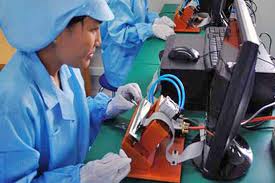VietNamNet Bridge – Besides Samsung, Nokia and some other foreign investors
have also been operating as export processing enterprises.
Hi-tech projects: foreign guests reap more fruits than the landlord
 |
|
|
Vietnamese agencies, which have learned lesson from SEV case, clearly stipulates the duties for Nokia to fulfill when it granted investment license. The investor will have to fulfill the nine commitments it has made to the competent agencies.
The commitments include the issues relating to the transfer pricing, the sale of the products to the domestic market, which would bear the value added tax and import tax as stipulated by the current laws.
Also, the Vietnamese side has also set detailed requirements on the modernity of the production line at Nokia’s factory in Vietnam, which would be assessed in the comparison with other leading factories in the world.
Especially, Nokia has to commit that the percentage of locally made content in the products would reach 30-50 percent, 3-4 years after the operation enters the stable period. Besides, five percent of the company’s workforce who have university degree would directly join the research and development activities of the company.
However, in return, Nokia Vietnam would also enjoy a lot of incentives. The 10 percent corporate income tax rate would be applied to Nokia Vietnam for the first 15 years of operation, since the day it officially becomes operational. It would also enjoy the corporate income tax exemption for four years and the 50 percent tax reduction in the next nine years.
The mobile phone products to be manufactured by Nokia in Vietnam would be recognized as hi-tech products, while Nokia has committed to meet five requirements as stipulated in the High Technology Law.
As such, 16 years after Nokia’s products began penetrating the Vietnamese market through some big distributors in the country, Nokia has decided to enter a new period of doing business. The golden age of Nokia’s products in Vietnam, when Nokia’s products held 65 percent of the market share, is over. However, this does not hinder the investor to seek the advantages in Vietnam to make mobile phones.
Shutting down the production bases in Europe, laying off workers, Nokia has shown its plan to focus on making smart phones at its factories in Asia, where it can find the profuse and cheaper labor force than any elsewhere in the world.
The noteworthy thing is that Nokia Vietnam has registered the operation under the mode of export processing enterprise. The incentives offered to export processing enterprises, plus the incentives offered to hi-tech enterprises both would bring fat profits to Nokia, which also means that the State should not expect to collect much money in tax from the investor.
While Vietnam has been making every effort to attract more new foreign investors to Vietnam, it seems to forget about the great achievements made to the national economy development by the existing investors who have been present in Vietnam for the last many years.
Automobile manufacturers prove to be the biggest tax payers, i.e. they have “enriched” the state budget.
Ford Vietnam, for example, pays 2 trillion dong every year to the state budget. Meanwhile, the automobile manufacturers with higher output, like Hyundai Thanh Cong, pays 4 trillion dong a year.
In general, the State collects 40 trillion dong a year in taxes, fees and charges relating to autos. Meanwhile, they are facing big difficulties due to the new policies on tax and fee.
Source: Doanh Nhan